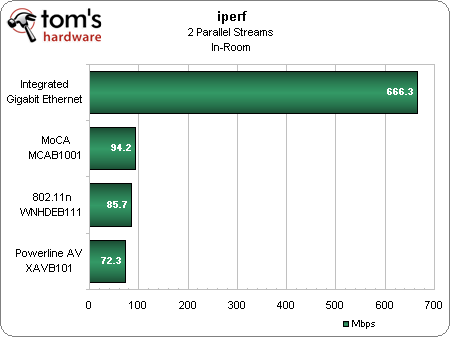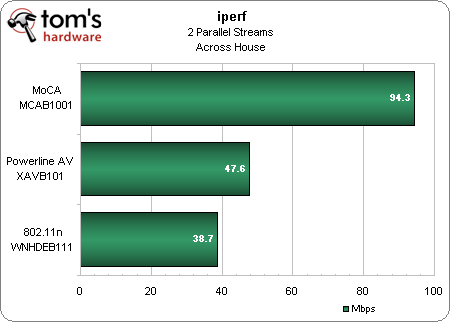Which Networking Technology Is Right For Your Home?
Benchmark Results: Iperf Bi-Directional Tests
We used iperf to test bi-directional performance under TCP. This is important because many multimedia applications still use TCP and run data streams both to and from the server. Not everything is UDP, as Tom’s Hardware editor Chris Angelini discovered when trying to stream Blu-ray ISO images to his home theater. You need a solution able to handle hi-def in both protocols. Netgear suggested the Iperf parameters we’ve mentioned for testing this specific application type. When the download and upload scripts are run concurrently, the total throughput can be added. Iperf runs TCP and UDP on port 5001 by default.
We expected slightly higher Gigabit Ethernet results, but 666.3 Mb/s is still a reasonable number. MoCA essentially takes every last bit that can be crammed through Netgear’s 100 Mb/s Ethernet port. Our 5 GHz and powerline parts also turn in decent performances. Interestingly, 5GHz 802.11n takes about a 20% waltz past powerline on this test, but it’s a fleeting victory.
When it comes to doing distance streaming in the home, there’s no question that MoCA continues to dominate for homes that lack in-wall Gigabit Ethernet, again taking that 100 Mb/s port to its limit and showing zero drop-off in performance across the home. Meanwhile, powerline takes a 35% hit and 5 GHz gets whacked to 55% of its in-room level. Given that we’re talking average TCP performance levels here, we’d be hard-pressed to trust 5 GHz for the most demanding bi-directional media tasks, and even powerline would give us pause. For those who can’t string Gigabit Ethernet, MoCA is clearly the only choice when high performance is needed.
Get Tom's Hardware's best news and in-depth reviews, straight to your inbox.
Current page: Benchmark Results: Iperf Bi-Directional Tests
Prev Page Benchmark Results: Zap Tests, Across House Next Page Latency And File Transfer-
rebturtle I'll be bookmarking this article for customers who tell me, "No, I don't want a wired LAN, I picked up this wireless router at WalMart....."Reply -
neiroatopelcc I like the netgear floorplan "Stairs to go upstairs" ... great!Reply
And nice article btw. Imo I'd have put the first rant about netgear after the section detailing that you're using it, so it looks more like an explanation than an advertisement (page 1) though. -
anamaniac Thank you for the article.Reply
I decided to skip getting a switch (as I still want interent on all connected devices anyways), and grabbed a 2.4/5GHz 820.11n gigabit router...
Has done well for me, just too bad my PSP can't use wireless N.
I've been tempted (and almost did) put new holes in my walls to drag my cat6 cables around my house (I only grabbed cat6 over cat5e because of the colour of the cables at my shop, however I do somewhat regret it because cat5e is a lot more flexible). -
neiroatopelcc Q: can regular people like I download the zap benchmark software somewhere? I'm the guy being blamed if our corporate network in two towns breaks down, and lately I've been hammered for unstable wireless network and can't find any cause for this. Would like to see minimum performance for our access points (got about 40 meru aps with dual radio and a,b,g and n concurrently).Reply -
Spanky Deluxe Gigabit ethernet throughout the house running through a gigabit switch in the garage here with 802.11g for the laptops until I get round to replacing the router we got with our broadband supplier with an Airport Extreme.Reply
Luckily the previous owner of the house was a network engineer and had left all the wiring throughout the house. I just hooked up a cheap second hand gigabit switch off eBay and have been loving it ever since. -
NicNash If you connect a power-line connector from a computer that is also connected to a wireless n network, to that router... will it use both adapters at same time? or whichever to provide best speed?Reply
weird thought.. but yea -
NicNash btw great article on these lesser known technologies. this article is worth its weight in gold to those who careReply -
neiroatopelcc nicnashIf you connect a power-line connector from a computer that is also connected to a wireless n network, to that router... will it use both adapters at same time? or whichever to provide best speed? weird thought.. but yeaDepending on the OS, but if you're running a standard microsoft os, it'll use whichever it detects a gateway on first. Has nothing to do with which is fastest or most reliable.Reply
Type route print in cmd if you want to see what it uses

